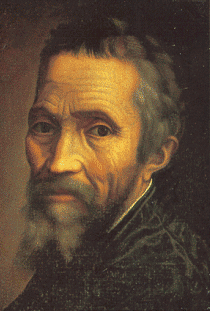
INSPIRING WORDS.
"Genius is eternal patience."
WHO said these words?
—Michael Angelo.
No one could utter them better than himself; for through a long life he toiled constantly, laboriously, into his ninetieth year, when Death took him.
In March, 1475, in the Castle of Caprese, was born a child whose father, a native of Florence, was governor, or podesta, of the towns of Caprese and Chiusi. When the father returned to Florence, the little child Michael was left at Settignano, on an estate owned by his family, in a stone-mason's cottage, whose wife was the boy's nurse. As soon as he could use his hands, he began to draw pictures on the walls of the house. These pictures are still shown as remarkable;
although at 'the time, I have no doubt the poor stone-ma-son's wife must have scolded just like any other woman, at her tidy walls being used in this way.
The father, Ludovico Buonarotti, had very little relish for the idea that his son was destined to become an artist. He wanted him to be a scholar; but long before Father Buonarotti's day, it had been proved that genius will have its way.
And so in 1488, when the lad was - thirteen years of age, we find him engaged as a pupil to Ghirlandaio. This Domenico Ghirlandaio, who was one of the best masters of Florence, was engaged in restoring the beautiful though faded paintings in the old church of S. Maria Novella; so that the young enthusiast was immediately surrounded by the most inspiring scenes of great painters. But as often happens, alas! His rapid progress soon made his fellow-pupils very jealous, and even the master himself. For one day at the hour for dinner, the young Michael sketched the scaffolding and the painters upon it with such powerful and telling strokes that Domenico exclaimed passionately, "He understands more than I do!" which soon proved true, for Michael drew on the drawings set for the pupils by the master, correct lines for incorrect ones. This probably did not increase the love between master and pupil.
The first picture produced by Michael Angelo, of which we have mention is an enlarged copy of the
"Temptation of St. Anthony."
And here I want to mention to the young folks who are, trying to do anything well, just this fact:
One means of Michael Angelo's success was, that he never left any means untried by which he might do his work in the best way possible. Remember he was but a boy at this time, but his soul was in his work..
Yes; this lad while drawing his copy of the great picture, wishing to perfect himself in the study of fish, went to the fish-market and made his observations from life subjects, making all sorts of drawings of the scaly tribe, until he had mastered the art of expressing them on paper.
I cannot speak of his long and eventful life,—his life so crowded with labor that a great book on art would be necessary to mention the works either completed or begun by him. Neither do I wish to here. I only desire to awaken the young minds to study for themselves the grand life of this old master in art, while I give them the keynote of his life from which the melody was struck.
It was work,—patient, steady work. Oftentimes it was in, the face of failures, through disappointments, the hatred of rivals, and men's caprice.
But he can never be forgotten so long as any of his grand and beautiful works remain.
Another incident shows how faithfully he labored to produce naturalness in his subjects. Becoming acquainted with Lorenzo Dei Medici, then at the head of the government in Florence, he was soon granted free admittance to the gardens of S. Marco, where the works of sculpture, cartoons, and pictures, were exposed. Several young people were here under old Bertoldi, the Sculptor.
Michael Angelo now threw aside his paint brush and palette for the chisel, thereby increasing a thousand-fold his poor father's dismay, who thought it quite bad enough for his son to be a painter, but that he should become a "stone-mason" was a height of misery scarcely to be endured! One day the young man copied the mask of a faun, but he opened its mouth so that the teeth were seen. Lorenzo, looking at it, said, "Your faun is old, yet you have been good enough to leave him his teeth."
The next time Lorenzo visited the gardens, he looked at the faun. One tooth was out, yet so naturally, as if it had tumbled out from an extremely aged mouth, that the noble visitor was enchanted at the success of the marble figure.
Michael Angelo was often sorrowful and alone.
Living to such a great age, he saw many of his chosen friends and congenial companions die; yet he was ever strong in trust and obedience toward God: Michael Angelo- The name is a light through all the ages, to any who, toiling with the head, the hands, or the heart, desire to enroll in the band of noble workers. Remember his words,
"Genius is eternal patience."
Margaret Sidney.